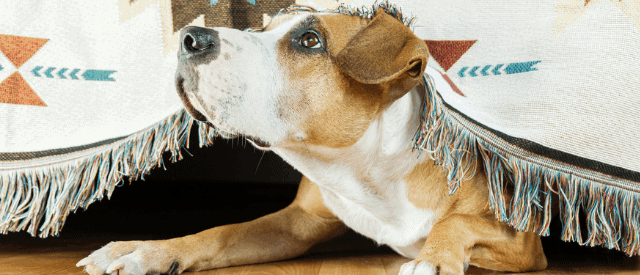We all love to browse through images of adorable dogs on social media, but make sure to pay close attention to the dog’s body language in each picture.
Most people are aware of the “happy” signs like when a dog is wagging his tail. That said, it’s easy to find photos and videos online where owners don’t seem to recognize that their dog is anxious or afraid, instead of happy.
It can be challenging to identify anxiety in dogs because some signs of anxiety in dogs are very subtle, and just like many people, dogs can be very good at hiding their anxieties and fears! Anxiety in dogs, and in humans, is defined as a sense of nervousness or worry about something that may or may not happen. In this article we look at how to spot the signs of anxiety in your dog and how to help them overcome their fears!
Why do dogs develop anxiety?
Dogs can become anxious for a variety of very different reasons, factors that may influence a dog’s tendency to develop anxiety are upbringing, breed, socialization, and the extent of their exposure to varied environments. A form of anxiety that many puppies suffer from is called separation anxiety.
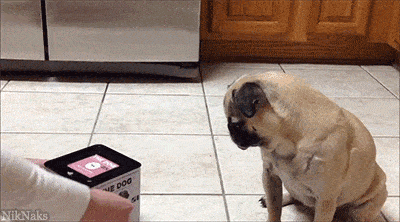
How common is anxiety in dogs?
A study in Finland found that over 70% of dogs display some form of anxiety-like behaviour. The types of anxiety identified in the study range from noise related anxiety to fear of other dogs and also fear of surfaces and separation from their owners.
Signs of anxiety in dogs
There are many signs of anxiety in dogs that can range from mild to severe.
Look for the body language
Dogs that are slightly anxious may pull their ears back and down, or they may cower down low and tuck their tail between their legs. Rolling over on their back and exposing their belly can also be a sign of anxiety, although there are some happy and excited dogs who do this. Other signs include looking away or avoiding eye contact, yawning while not tired, lifting up a front paw, and lip-licking. More obvious signs include trembling, panting, pacing, and restlessness.
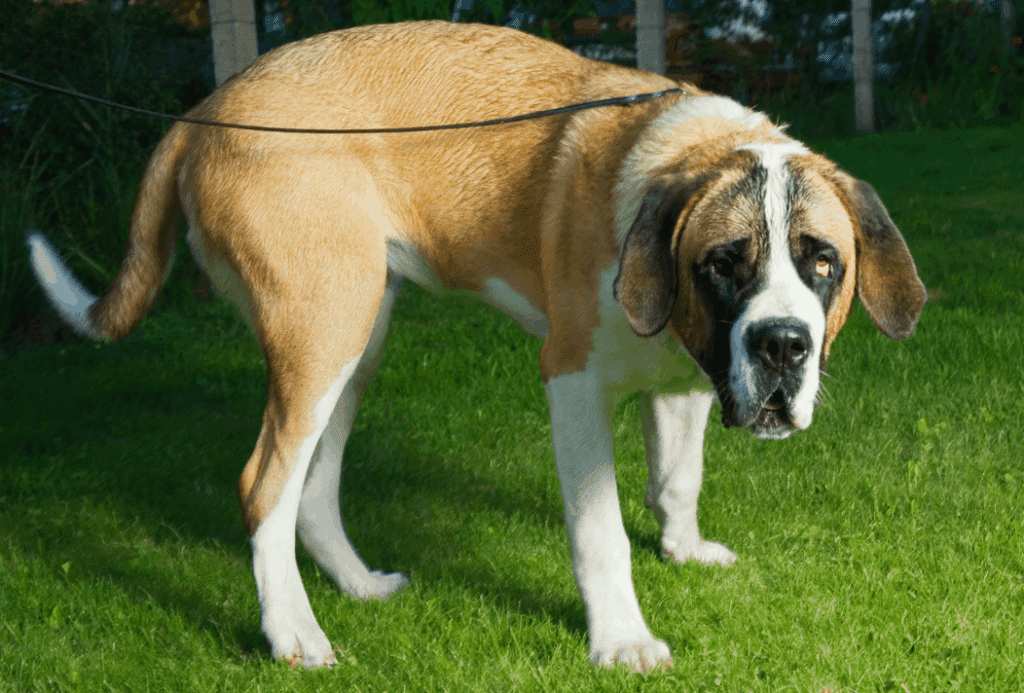
Destructive behaviour
In severe cases, dogs may engage in destructive behavior. They may chew on walls, furniture, and even their crate if they have one. They can hurt themselves trying to escape from their crates, or they can fracture a tooth when chewing on hard surfaces like walls and doors.
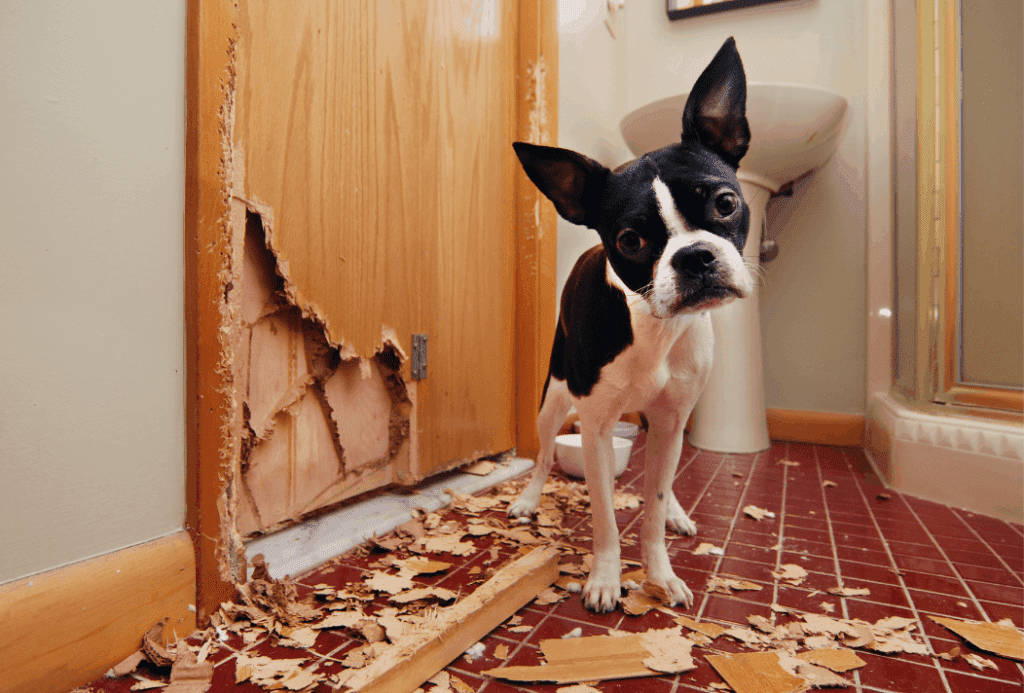
Worn teeth from destructive chewing
Dogs with chronic anxiety may have worn teeth due to destructive chewing. This can lead to tooth pain which may cause dogs to eat less food.
Gastrointestinal problems & weight loss
Gastrointestinal upset can also result from chronic anxiety and can cause a decrease in appetite as well as poor absorption of nutrients in the gastrointestinal tract. All these problems can cause your dog to lose weight. For more details on weight loss in dogs, be sure to check out our latest article.
How do you treat a dog with anxiety?
When it comes to treatment recommendations for dogs with anxiety, no two treatment plans are the same.
Dogs with mild anxiety may benefit from behavior modification and training alone, and some dogs may need medications and supplements to help calm them enough so that they are more amenable to learning and training. Dogs who are actively showing signs of stress and anxiety may not be as easily trained as relaxed and calm dogs.
Medical management
Fluoxetine and clomipramine are two medications that are FDA-approved for use in dogs with anxiety. These medications are also good for separation anxiety and have a longer duration of action than the short-acting medications that are used prior to acute stressful events. It can take anywhere from one to four weeks to reach maximum effect, and in some cases, these medications can cause gastrointestinal upset or restlessness. If you suspect that your dog is having an adverse reaction to fluoxetine or clomipramine, be sure to contact your veterinarian right away.
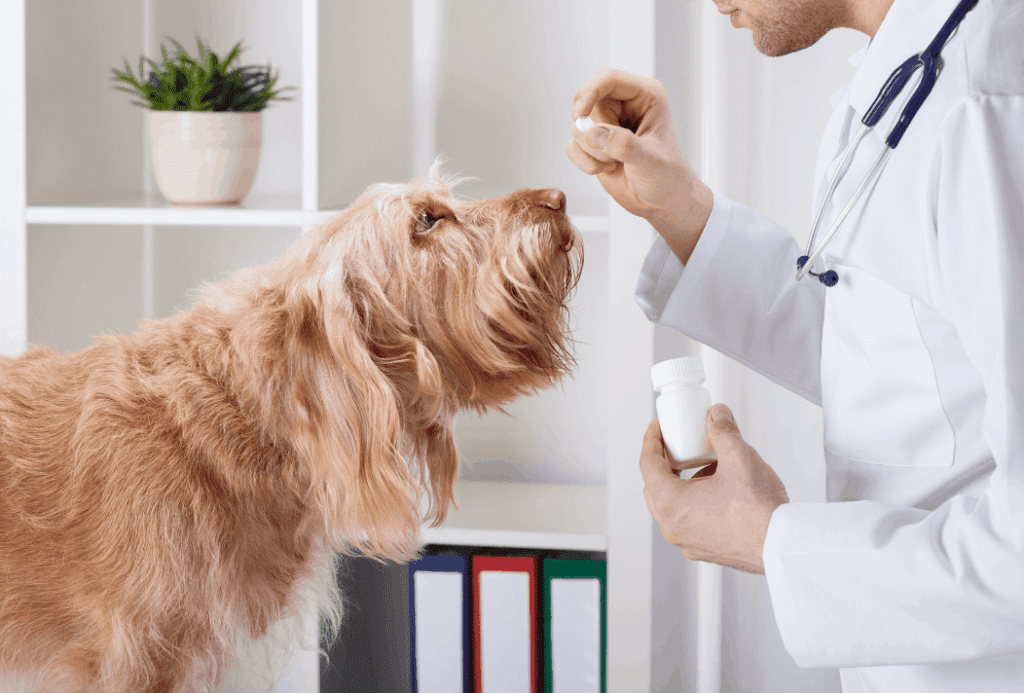
Calming products that use natural ingredients
There are many calming products available for dogs that use natural ingredients. Dog-appeasing pheromone products are available in collars, sprays, diffusers, and more. This pheromone is odorless to humans and can help dogs with mild anxiety. Various supplements are also available that contain ingredients used for helping with mild anxiety. Some of these ingredients can help your dog sleep better while others can help increase serotonin (aka “happy” hormone) levels in your dog’s body.
CBD Oil and your dog
CBD oil, or cannabidiol, is an oil derived from the hemp plant. It is generally used for pain, inflammation, glaucoma, and anxiety in people. Products like CBD oil are becoming more popular for use in dogs. There is very little scientific evidence to support the use of CBD oil for these issues in dogs. However, there is abundant anecdotal evidence to support its efficacy, and there is active research being conducted to study its safety and efficacy in dogs with seizures and anxiety. Many veterinarians are hopeful that research will yield more information so that vets can safely recommend it for their patients.
Identify the triggers of your dog’s anxiety
When evaluating your dog’s anxiety, it helps to identify your dog’s triggers and avoid them whenever possible. For example, if your dog tends to become anxious or nervous when you put your shoes on in the morning, then you may need to avoid putting your shoes on in front of him. Other visual cues include sunglasses, bags, and car keys. If your dog tends to bark at people outside of your window, then keep the blinds closed or the curtains drawn so that he can’t observe people passing by. If certain sounds upset your dog while you are away from home, then leave the television or radio on so that the noise helps drown out some of the stressful outdoor noises.

Behavior modification and training
Behavior modification and training are the most important parts of addressing your dog’s anxiety, and they are the best ways to achieve lasting results.
Desensitization and classic conditioning are some of the training methods used to help dogs with anxiety. Predictable routines in a calm environment can help facilitate training, you will want to make sure that you create a safe space for your dog.
Because it can be difficult to train anxious dogs, your veterinarian may recommend some of the medications and supplements mentioned above. Favorite treats, toys, and other rewards are some of the best tools to use when training your dog because dogs tend to learn best with positive reinforcement versus negative reinforcement.
Consistency is key to the training process because dogs tend to fall into very set routines. You must also be patient because anxiety can take time to improve, especially in cases with moderate to severe anxiety.
It can be difficult to detect and treat anxiety in dogs
The signs of anxiety in your dog may be very subtle! By learning the clinical signs and triggers in your dog, you can identify anxiety right away and help him to feel better faster.
When treating an anxious dog, it is best to establish your goals from the beginning. What would you like to see for your dog? Can you create a safe space for your dog to help make changes in his behaviour? Your veterinarian is the best person to help you get there, and in some cases, she may refer you to a veterinary behavior specialist for your dog’s treatment plan.
Remember, it can take weeks or even months to help your dog’s anxiety improve. Be patient! There are many different methods for training and behavior modification, make sure to check out our behavior category for more information.



